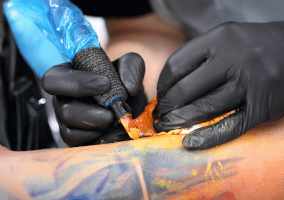Welcome to a thought-provoking discussion on whether tattoos should still be considered unprofessional. In this persuasive speech, we will delve into the societal perceptions of tattoos and challenge the notion that they are incompatible with professionalism. As tattoo culture continues to evolve and gain acceptance, it’s essential to reevaluate the stigma associated with tattoos in the workplace.
For many individuals, tattoos are a form of self-expression and art, showcasing personal beliefs, memories, or cultural identity. However, despite the growing popularity of tattoos, some industries still view them as unprofessional or inappropriate for the workplace. This bias against tattoos can limit job opportunities and perpetuate stereotypes that are outdated and discriminatory.
As we navigate the complexities of tattoo culture and workplace norms, it’s crucial to consider the following points regarding the perception of tattoos in professional settings:
Challenging the Stigma of Tattoos
One of the primary reasons why tattoos are deemed unprofessional is due to long-standing stereotypes associated with body art. Tattoos were once synonymous with rebellion, counterculture, or criminality, leading to negative perceptions in mainstream society. However, as attitudes towards tattoos continue to shift, it’s essential to challenge these outdated stereotypes and recognize tattoos as a legitimate form of self-expression.
Addressing Common Concerns
- Do tattoos impact job prospects?
- How do tattoos influence credibility and professionalism?
- Are there industries where tattoos are more accepted?
Breaking Down the Perception Barrier
Despite the progress made in destigmatizing tattoos, there are still instances where individuals may face discrimination based on their body art. This discrimination can manifest in the form of dress codes that prohibit visible tattoos or biased hiring practices that prioritize individuals without tattoos. By breaking down the perception barrier surrounding tattoos, we can create a more inclusive environment that values diversity and individuality.
Tips for Overcoming Tattoo Stereotypes
- Choose placement and design wisely to maintain professionalism.
- Educate employers about the changing attitudes towards tattoos.
- Advocate for workplace policies that promote inclusivity and diversity.
The Evolution of Tattoo Culture
As tattoo culture continues to evolve and diversify, it’s important to acknowledge the rich history and significance of tattoos in different cultures. From traditional tribal tattoos to modern-day sleeve designs, tattoos reflect a myriad of meanings and traditions that go beyond mere aesthetics. By embracing the diversity of tattoo culture, we can challenge the narrow perceptions of tattoos as unprofessional or unsuitable for certain environments.
Empowering Tattoo Enthusiasts
- Encourage open dialogues about tattoos in professional settings.
- Promote self-confidence and self-acceptance among individuals with tattoos.
- Advocate for policies that respect individual choices and expressions.
In conclusion, the question of whether tattoos should still be considered unprofessional is a complex issue that requires thoughtful consideration and reflection. By challenging stereotypes, advocating for inclusivity, and embracing the diversity of tattoo culture, we can create a more accepting and understanding society. Let’s work together to break down the barriers that limit self-expression and promote a more inclusive and diverse workplace environment.











